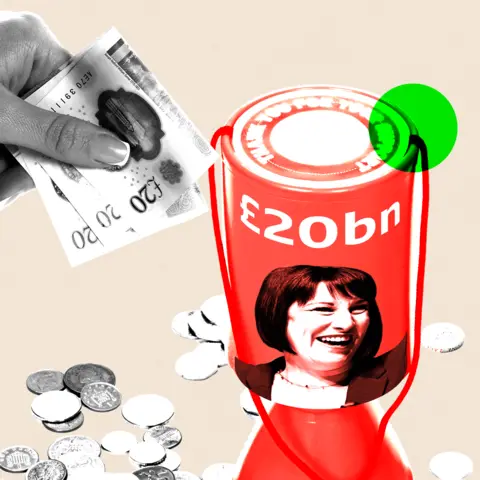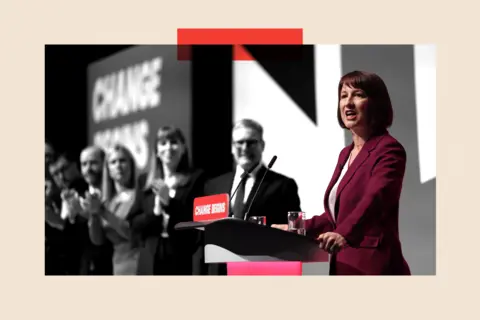
 BBC
BBCWe’re just a few weeks from the government’s crucial first Budget on 30 October and it’s clear Chancellor Rachel Reeves intends to raise money.
There is a black hole in public finances, she says – based on her apparent discovery since arriving at No 11 Downing Street in July of an unbudgeted £22bn overspend in the current tax year.
Now, whether that really is a newly discovered black hole is a matter of dispute. Either way, given Ms Reeves has ruled out borrowing to fund day-to-day spending, she is still likely to need to raise taxes to pay for that spending.
So if you were in her position, how might you go about raising it? Let’s not pretend this is too precise a game – we’ll call the figure £20bn for simplicity’s sake.
This figure is somewhat arbitrary. In truth, the overspend this year is of little relevance when it comes to how much extra tax you need next year or in five years’ time. And one imagines the Budget will mostly find tax rises that bite in 2025-26 and beyond.
In any event, when the Budget comes, we will have an updated economics forecast, new projections for how government revenues and spending are looking, possibly a new fiscal target as well. So a lot will change by 30 October.


Nonetheless, if you were a chancellor with the task of finding £20bn in front of you, then you would probably like the option of being able to increase the rates of one of the big four taxes: income tax, VAT, National Insurance and corporation tax. Together, they represent two-thirds of the total cash that the government receives.
However, for better or worse, the chancellor ruled out such tax rises in the election campaign, and she has made it quite clear that she is not going to abandon her pledges. So for our purposes, such tax rises are clearly verboten.
That is a significant constraint. Remember that in its last year, the Conservative government cut taxes by £20bn by slashing the rate of National Insurance. One way of raising money would simply be to reverse that cut and take us back to where we were before last November.
So by ruling out a Tory National Insurance cut reversal, the chancellor has made our game of finding £20bn far more… taxing.
But once you’ve put all those tax rises to one side, there are still more potential routes to raising extra revenue that we can look at.
One is through capital gains tax, charged on profits made from the sale of an asset that has increased in value, such as second homes or shares not held in individual savings accounts (ISAs).
But when it comes to capital gains tax “I don’t think immediately it will raise a vast amount of money”, says Judith Freedman, emeritus professor of tax law and policy at the University of Oxford. “It might bring in a few billion, it’s not going to give you £20bn.”
Another route is through inheritance tax. But this “only kicks in when you are quite wealthy”, says Dan Neidle, founder of the think tank Tax Policy Associates.
Between them, capital gains tax and inheritance tax raise less than £25bn a year at the moment, so to get an extra £5bn would still require a sizable jump in those taxes.
However, there are also ways you could raise cash through higher National Insurance or income tax, without actually changing their headline rates.
When it comes to National Insurance and income tax, far bigger amounts are at stake if the chancellor is minded to look at the rules governing the tax treatment of pension contributions.
At the moment, for most people, if you put any earnings into a pension, you don’t pay income tax on those earnings. And if employers contribute to a pension on your behalf, they don’t pay employers’ National Insurance on that, as they would if they gave it to you as salary.
Between them, these perks cost the exchequer about £50bn a year. Most of that benefit goes to higher earners, who not only put more into their pension pots, but who often deduct income tax at a higher rate than the average worker.
It is an area ripe for reform. Indeed, the right-of-centre think tank, the Centre for Policy Studies, proposed a radical reform of the system 12 years ago. A left-of-centre chancellor will be keen on the potential revenue to be found here.
 Getty Images
Getty ImagesNow it has to be said, when it comes to squeezing more tax out of a population, there are two broad approaches a chancellor can take. We might call them the expedient and the economic.
The expedient is to search for places where you can raise money with a minimum of squealing. On this approach, there doesn’t have to be much logic to any tax rise – it’s just about finding the money in hidden corners.
The economic approach is slightly different. It starts with the idea that there are more and less logical ways to tax people, and that the tax system should avoid picking on certain types of activity in arbitrary ways.
In this world, you usually want to avoid taxing some income or savings more than other income or savings, because that would likely be unfair and it would distort people’s decisions.
On this account, you need to have a vision for how all the pieces of the tax system interact. “Fiscal neutrality” is a phrase that has sometimes been used to describe a system that is designed to tax in as level a way as possible.
And although our tax system is manifestly full of anomalies and illogicalities, when it comes to pensions specifically, economists often share a broad vision of what a fiscally neutral tax system should try to do.
The basic principle is that people should pay tax once – not twice – on pensions.
So you either give tax relief upfront, on the money people put into their pension savings, then you tax the pension income people enjoy when they get old. Or you give no upfront relief at all and tax the income going into a pension fund, but you charge no tax on the pension when it comes out.
Judged against these principles of neutrality, our current system is a bit of a mess.
Many people get 40% income tax relief on what goes into a pension and pay 20% on what comes out. That’s not logical.
Also, employers’ National Insurance isn’t charged at either end; and you can get a tax-free lump sum when you take a pension, even though you had tax relief on the money you contributed to that.
You don’t need to understand all these details to see that a chancellor who wants extra tax revenue can look at pension contributions and will see an orchard full of ripe fruit for picking.
And what makes it very compelling is that the orchard looks bountiful whether you’re gazing at it through the glasses of expediency or through the lens of economic logic.
Sir Edward Troup, a tax lawyer who has worked in the Treasury, expects the chancellor to take action in this area in the Budget.
“The question is how far, how fast does she go?” he says.
“Does she really try and get some money in the next few years – which will be painful – or does she introduce some reforms that have got slow burn and build up tax receipts from people who are retiring over the next five, 10, 20, 30 years?”
I also wonder whether the Budget will try to tidy up the illogicalities of the system, or simply be about raising as much as possible?
It’s possible, of course, that there could be important tax changes other than those I’ve talked about. More than one of PM’s listeners wrote in to suggest a new tax on land values (an idea popular with the Greens and sometimes the Liberal Democrats). It may be a step too far for this Budget, even if it’s one that many economists find appealing.
An important thing to note is that a £20bn tax rise will be significant for the exchequer, but it’s by no means enormous in historic terms. It’s equivalent to about £6 a week, for every man, woman and child in the country or £25 each week for a family of four.
Another way of looking at it is that would keep NHS England going for about 40 days a year. Or putting it another way, £20bn is less than 1% of our annual national income. And it’s about 1.7% of total government spending. It’s not revolutionary, but nor is it nothing.
And we’ll have to wait until 30 October to see exactly which approach Rachel Reeves takes.
BBC InDepth is the new home on the website and app for the best analysis and expertise from our top journalists. Under a distinctive new brand, we’ll bring you fresh perspectives that challenge assumptions, and deep reporting on the biggest issues to help you make sense of a complex world. And we’ll be showcasing thought-provoking content from across BBC Sounds and iPlayer too. We’re starting small but thinking big, and we want to know what you think – you can send us your feedback by clicking on the button below.






